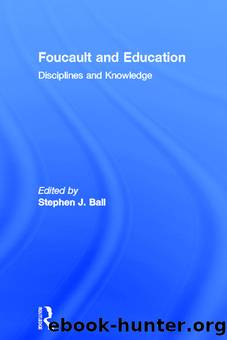Foucault and Education by Unknown

Author:Unknown
Language: eng
Format: epub
ISBN: 1189375
Publisher: Taylor & Francis Group
Psychiatry in Nineteenth-Century France
From roughly the beginning of the nineteenth century to the First World War, French psychiatry changed from a new medical specialty with an uncertain future to an accredited branch of organized medicine with academic and professional status. Yet this was not a painless or uncontested process. Throughout the nineteenth century French psychiatrists - or 'alienists' as they called themselves - had to confront and surmount many obstacles. The most serious obstacle was the psychiatric failure to demonstrate in pathoanatomical terms what precise organic conditions corresponded to the varieties of psychological symptoms a typical asylum physician encountered. This failure made it extremely difficult for psychiatrists to maintain that they were legitimate physicians, for their medical credentials rested on the supposition that they cured the mind thanks to their understanding of the somatic conditions which caused madness. Without these medical credentials, they could not plausibly justify their efforts to oust the clerical orders of the Catholic Church from public asylums, arguably the most important professional task for nineteenth-century French psychiatrists. Nineteenth-century psychiatrists, then, longed to be recognized as bona fide physicians, and in pursuit of this goal they followed a strategy calculated to win the profession a foothold in the expanding university system of the 1870s and 1880s. Like school subject teachers, asylum doctors believed that the key to securing augmented resources and expanded career opportunities for their occupational practice lay in the establishment of their medical specialty as a distinctly academic discipline with university chairs, able students, examinations, and fully accredited clinical courses.
In the status passage from 'alienists' to psychiatrists, the construction of particular kinds of knowledge played a vital role. As we shall argue, medical claims to expert knowledge of madness in the second half of the nineteenth century were valuable to psychiatrists interested in professionalization because they conveyed the impression that asylum alienists were something more than 'moral entrepreneurs' to use Eliot Freidson's (1970) terms. They aspired to lay claim, in Freidson's words, 'to knowledge of an especially esoteric, scientific, or abstract character that is markedly superior' to the claims to knowledge of 'amateurs' such as the clerical orders of the Catholic Church. The evolution of psychiatric knowledge enabled alienists to forge 'a political settlement' with the French state that guaranteed their status, material interests, and social authority in the face of persistent public criticism. As we shall see was the case with the teachers of school subjects and the associated bodies of school knowledge, so with psychiatrists and psychiatric knowledge a number of stages can be discerned in the evolutionary profile.
Psychiatry began by justifying its status as a medical specialty and as a socially useful profession with appeals to its utilitarian role in curing the disease of insanity. But for a variety of reasons that we shall outline below, these appeals had become outmoded or irrelevant by mid-century. In order to enhance their prestige and power to command the material resources of the state Ministry of the Interior, psychiatrists in the second half of the
Download
This site does not store any files on its server. We only index and link to content provided by other sites. Please contact the content providers to delete copyright contents if any and email us, we'll remove relevant links or contents immediately.
The Art of Coaching Workbook by Elena Aguilar(51198)
Trainspotting by Irvine Welsh(21663)
Twilight of the Idols With the Antichrist and Ecce Homo by Friedrich Nietzsche(18632)
Fangirl by Rainbow Rowell(9249)
Periodization Training for Sports by Tudor Bompa(8271)
Change Your Questions, Change Your Life by Marilee Adams(7780)
This Is How You Lose Her by Junot Diaz(6886)
Asking the Right Questions: A Guide to Critical Thinking by M. Neil Browne & Stuart M. Keeley(5775)
Grit by Angela Duckworth(5614)
Red Sparrow by Jason Matthews(5471)
Paper Towns by Green John(5190)
Room 212 by Kate Stewart(5119)
Ken Follett - World without end by Ken Follett(4731)
Housekeeping by Marilynne Robinson(4446)
The Sports Rules Book by Human Kinetics(4386)
Papillon (English) by Henri Charrière(4274)
Double Down (Diary of a Wimpy Kid Book 11) by Jeff Kinney(4268)
The Motorcycle Diaries by Ernesto Che Guevara(4098)
Exercise Technique Manual for Resistance Training by National Strength & Conditioning Association(4071)
